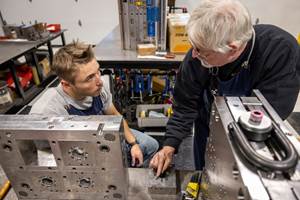SME Technical Communities: Serving Niche Markets
Eight technical groups each focus on a niche to better serve the needs of the moldmaking industry.
The Society of Manufacturing Engineers (SME) is well known in the manufacturing world for its unwavering commitment to advancing manufacturing knowledge through information sharing, education and networking. It also had the foresight to recognize that a niche industry like moldmaking wasn’t able to utilize the SME to its fullest extent, and so the organization was determined to right that wrong by founding SME Technical Communities (see Community Service Sidebar). These targeted groups allow mold professionals to zero in on a group specific to their specialty.
In 1999, senior leadership within the society—including both members and staff—decided it needed a more effective forum for members to meet and network. So, the SME Board of Directors developed a technical oversight group at that time to come up with a new model for more effective, non-bureaucratic member engagement. The Manufacturing Enterprise Council—made up of executive leaders from industry, government and academe—formed and decided to begin the SME Technical Community Network.
Building Blocks
The SME Technical Community Network (TCN) is made up of eight communities. Each community encompasses technical groups on a specific technology or process within manufacturing. “Like the atoms within a molecule, the members of each community are linked to the other members of the network,” SME Community Relations Manager Rodney Grover states. “Groups can form to take on a particular area of interest and disband when their discussions or projects are completed.”
Members of each Technical Community meet regularly—primarily via the Internet and conference calls—as frequently as they wish. They also hold technical discussions, hear presentations, solve a problem that a group member has encountered, author and review publications, and develop conferences and events. Together, the communities have developed a flagship event, The SME Summit, which is held annually to share technology developments with manufacturing practitioners from all disciplines.
One SME staff member (a community relations manager) is assigned to each community to facilitate interactions, and help bring product and service ideas forward into the product development areas of the Society, Grover notes, with one manager overseeing the overall program.
Grover notes that the Technical Communities are only for SME members. “SME members can join one or all of the SME Technical Communities at no additional charge to their membership fee,” he comments. Currently there are just over 12,000 SME members who have become community members—some signing up for membership in multiple communities.
Learning Curve
According to Grover, SME’s Technical Communities employees have “learned a tremendous amount about the power of members to keep the Society vibrant and healthy. Our best ideas come from our members; our job as employees is to do all that we can to turn ideas into products and services, market them well and to recognize our members for their dedication and commitment to their chosen profession: manufacturing.
“We have learned that keeping ideas flowing through the pipeline and into development requires good communication and respect between members and staff team members,” he continues. “Each person brings a contribution to the table. It also requires learning to communicate and manage our expectations. In an environment where many ideas are shared, each one doesn’t have the same potential to generate benefit for the greatest good.”
Another challenge the Technical Communities face head-on is developing systems support to link members with other members. “Aside from the issues of maintaining accurate e-mail addresses for each of our members, linking members with questions in one area to members with answers in another is something we are working on,” Grover comments. “It is one of the fundamental ‘uniquenesses’ of the communities as a network of colleagues.”
An example of rising to—and overcoming—challenges is the development of the SME Lean Certification program. SME has worked to create the only professional Lean Certification program on the market that is based on a public body of knowledge and not tied to any one training program. It has been developed by Lean practitioners across industries that have chosen a lean career path. Grover notes they have created a standard based on their knowledge and experience. The program is being managed by SME.
“This is the most shining example to date of the power of the SME membership to help define a relevant, timely tool for industry,” Grover says. “The idea for the lean certification grew out of the Lean Curriculum Technical Group—a technical group within the Product and Process Design & Management Community. We have calculated that to date, SME members and volunteers have contributed about two years worth of full-time-equivalent personnel time to this project.”
According to Grover, one of SME’s key strengths is that is offers manufacturing resources that cover the gamut of technologies and applications in the field—with the Technical Communities serving as a key program in deploying that strategy. “Professional associations such as SME need to be able to help their members find the answers to their professional challenges, quickly, easily and credibly,” Grover concludes. “The Communities allow our members to tap into the know-how of literally thousands of other professionals in their industry. It’s how we separate ourselves from other associations.”
Related Content
How to Improve Your Current Efficiency Rate
An alternative approach to taking on more EDM-intensive work when technology and personnel investment is not an option.
Read MoreConfronting the Mold Design Talent Drought
Recently, I reposted on LinkedIn the results of an informal survey we conducted, which revealed a shortage of skilled mold designers. It quickly gained a lot of traction. Given the response, I thought I'd summarize the feedback and keep the conversation going.
Read MoreEden Tool and Eden Manufacturing: A Story of Resilience, Growth and Innovation
This critical parts manufacturer, founded on solid tooling fundamentals, didn’t get derailed with the unexpected passing of the owner because leadership was already building a solid business, not just a good tool shop. Here’s how they managed change incrementally… and they’re not finished yet.
Read MoreHands-on Workshop Teaches Mold Maintenance Process
Intensive workshop teaches the process of mold maintenance to help put an end to the firefighting culture of many toolrooms.
Read MoreRead Next
Reasons to Use Fiber Lasers for Mold Cleaning
Fiber lasers offer a simplicity, speed, control and portability, minimizing mold cleaning risks.
Read MoreHow to Use Continuing Education to Remain Competitive in Moldmaking
Continued training helps moldmakers make tooling decisions and properly use the latest cutting tool to efficiently machine high-quality molds.
Read MoreAre You a Moldmaker Considering 3D Printing? Consider the 3D Printing Workshop at NPE2024
Presentations will cover 3D printing for mold tooling, material innovation, product development, bridge production and full-scale, high-volume additive manufacturing.
Read More





















